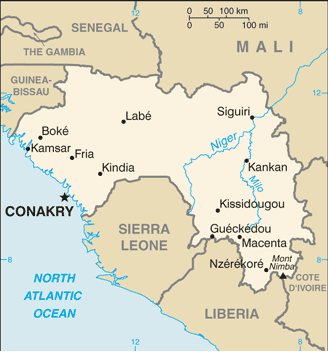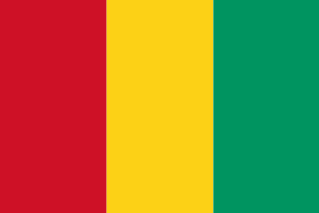
The country was ruled by the Ghana Empire until 1200, Mali Empire until 1600, and Wassoulou Empire until the mid-19th century. European explorers arrived in the 15th century, pioneered by the Portuguese. Later, the French took control of the coast and managed to subjugate the present-day territory of the country in the late 19th century after heavy fighting with the Wassoulou Empire. It was then included within the French West Africa greater colony, with the capital at Dakar, Senegal.
The French granted independence referenda for its colonies in 1957, the choices being sovereignty or autonomy within the French Community; though others would eventually be granted independence, Guinea made a name for wanting to secure its sovereignty as early as possible. Since then, autocratic governments with a dose of coups have been characterizing the country's politics as of late; the first president Ahmed Sékou Touré, in particular, banned oppositions and adopted socialism as the country's leading ideology, with close ties with the Soviet Union and (later) China. His rule saw a Portuguese infiltration with the ultimate goal of assassinating Touré, in revenge for supporting the PAIGC guerrilla movement advocating independence for Guinea-Bissau and Cape Verde. They achieved most of their goals except for killing Touré himself, who would rule until his natural death in 1984 of heart attack.
A coup shortly after Touré's death installed Lansana Conté, who ruled as dictator for 24 years until his death in 2008. Attempts of further coups by military generals, including Moussa Dadis Camara, were thwarted when the country was threatened with complete anarchy in 2009. A proper presidential election, the country's first, was finally held in 2010, which elected Alpha Condé as president. In 2021, however, Condé was deposed by the military in a coup, with the country being ruled by a military junta since.
In 2014, the West African Ebola virus epidemic, the disease's largest outbreak, had its head start in Guinea, when a 2-year-old boy named Emile Ouamouno contracted the disease, spread it to his sister, mother, and grandmother, the rest of their village, and eventually the entire country within a span of several months. In total, it infected 3,811 people and killed 2,543. It then went cross-border to Liberia and Sierra Leone, the former of which took the biggest hit in casualties overall. The epidemic officially ended on June 1, 2016, when the country reported no new cases of the virus.
Guinea has the world's largest reserves of bauxite, and is its third largest producer. Still, the economy is mainly dominated by agriculture. Most of the country remain undeveloped, and it also has one of the lowest HDI and the highest income inequalities in the world. It has, however, been spared from experiencing disastrous civil wars that saddled its neighbors Côte d'Ivoire, Guinea-Bissau, Liberia, and Sierra Leone.
The major ethnic groups are the Fula, Mandinka, and Susu people. The predominant religion is Islam, the religion having been brought through contacts with North Africa during the Middle Ages. There is also a significant Christian minority living near the border with Liberia.
Related works include:
The Guinean Flag

The Guinean national anthem
—
Government
- Unitary provisional government under a military junta
- Chairman of the National Committee of Reconciliation and Development: Mamady Doumbouya
- Interim Prime Minister: Bah Oury
Miscellaneous
- Capital and largest city: Conakry
- Population: 12,414,293
- Area: 245,857 sq km (94,926 sq mi) (77th)
- Currency: Guinean franc (FG) (GNF)
- ISO-3166-1 Code: GN
- Country calling code: 224
- Highest point: Mont Nimba (1752 m/5,748 ft) (139thnote )
- Lowest point: Atlantic Ocean (3,646 m/11,962 ft) (-)
